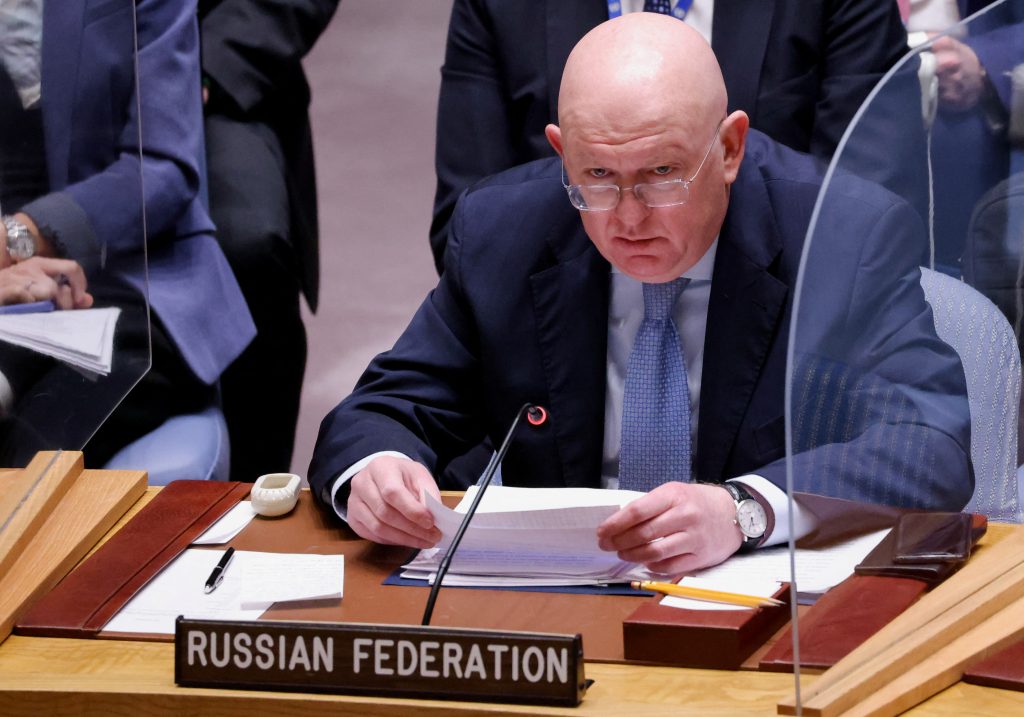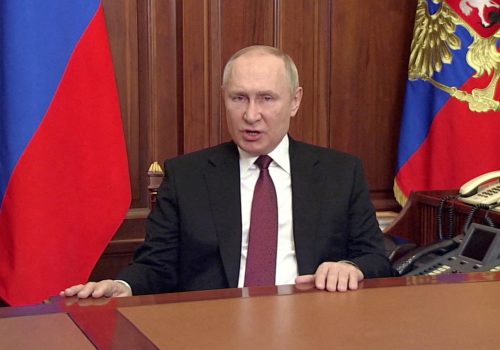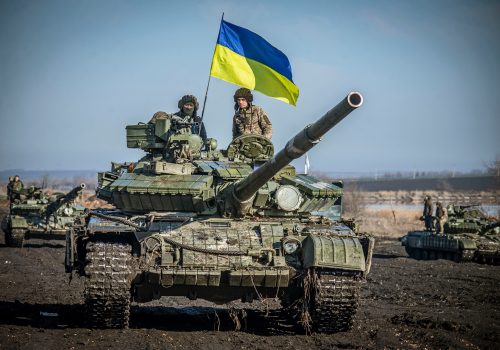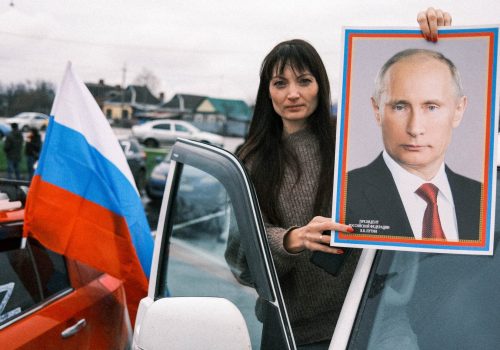“This is an extraordinary moment,” declared US ambassador to the United Nations Linda Thomas-Greenfield during a recent UN General Assembly (UNGA) emergency special session on Ukraine. “Now, at more than any other point in recent history, the United Nations is being challenged. If the United Nations has any purpose, it is to prevent war, it is to condemn war, to stop war.”
With this purpose in mind, in a sweeping show of international unity, 141 countries voted in favor of an UNGA resolution demanding an immediate end to the Russian offensive in Ukraine. While non-binding and largely symbolic, this overwhelming show of global support for Ukraine came at a time when it was doubly needed, both for Ukraine itself and for the sake of the UN.
Only four countries joined Russia in voting against the resolution. To the surprise of nobody, the list included Belarus, North Korea, Eritrea, and Syria. Thirty-five nations abstained.
Ukrainian President Volodymyr Zelenskyy applauded the outcome, declaring “Destructive results of the vote in the UN for the aggressor convincingly show that a global anti-Putin coalition has been formed and is functioning. The world is with us.”
Yet while Zelenskyy’s description of a global anti-Putin coalition may ring true for the UNGA, a meaningful multilateral response is still being blunted by Russia’s veto power in the UN Security Council (UNSC).
While the UNGA vote showed overwhelming global support for Ukraine, just a few days earlier the UN’s most powerful body sent a very different message. Despite the support of 11 Council members, the UNSC failed to adopt a resolution necessitating the immediate cessation and withdrawal of Russian troops from Ukraine following a single “no” vote from Russia. This once again highlighted the privileged and troubling role the five permanent members (P5) enjoy within the international body’s most powerful organ.
Stay updated
As the world watches the Russian invasion of Ukraine unfold, UkraineAlert delivers the best Atlantic Council expert insight and analysis on Ukraine twice a week directly to your inbox.
Under the UN Charter, the Security Council is imbued with both primary responsibility for the maintenance of international peace and security and the capacity to pass binding resolutions. Such decisions, however, are to be made with “the concurring votes of the permanent members,” thus requiring unanimous support (or abstention in lieu of) from the P5 nations.
While the UN Charter endeavors to restrict member states party to a conflict from blocking UNSC action, the provision has rarely been enforced by members reluctant to see similar caps placed on their own powers. As a result, no member state has moved to forestall or challenge Russia’s veto of the resolution.
The P5 have frequently wielded their veto power to torpedo resolutions incongruent with their national and foreign policy interests. Such machinations have been at the root of repeated Council inaction on Syria, Israel, and perhaps most memorably, Ukraine following the 2014 annexation of Crimea by Russia.
Unilateral obstruction in the Council has over time fed into growing criticism of the UN’s alleged irrelevance on the international stage. Established to foster global cooperation for the common good and consensual laws governing international behavior to preempt and mitigate interstate conflicts, today the UN is becoming increasingly captive to geopolitical rivalry and indecision. Russia is using its perch on the Security Council to distort international norms and sow discord in the pursuit of national interests.
In a series of perturbing televised addresses on February 21 and 24, Russian President Vladimir Putin evoked terms of international law in an undisguised bid to cloak Russian military aggression behind the guise of self-defense against alleged abuses and genocide perpetrated by Ukraine against Russians and Russian-speaking minorities in the Donbas, and the existential threat posed to “the very existence of [the Russian] state and to its sovereignty” by the West. The utter absurdity of these statements belies the extent of Russia’s exceptional interpretations and weaponization of normative frameworks governing national sovereignty, territorial integrity, and the use of force.
Russia’s invasion of Ukraine represents the largest conventional military attack since World War II. Over 2.8 million Ukrainian refugees have fled the country since the start of the assault as the civilian death toll continues to rise. Global outrage over the invasion has been powerful and the collective response has been surprisingly united, swift, and increasingly bruising.
Russia has faced a multifaceted international backlash with repercussions for its war on Ukraine hitting the nation in all parts of its economy and society. As British foreign minister Liz Truss said, Russia is becoming a “global pariah” and facing deserved isolation on the global stage.
A major part of such isolation has come through enactment of massive sanctions targeting Russian commerce and banking systems. Societal backlash has also been extensive, as a slew of multinational corporations from Apple to Boeing have suspended operations in the country.
Furthering its ostracization on the global arena is a growing movement to boycott Russian sports and cultural engagement. Perhaps most noteworthy is the galvanization of dramatic reversals in European foreign and security policy away from engagement with Russia.
Yet whereas much of the global response has been decisive in its freeze out of Russia, the UN remains a disappointing if not surprising holdout. The failure to mount more than symbolic condemnation for an attack perpetrated by a member of the P5 is irresponsible at best and evidence of a system fundamentally unable to live up to its mission.
Eurasia Center events

The magnitude and sheer audacity of Russian actions must represent an urgent wake-up call for the global community. This includes a pressing need to reevaluate the very institutions that enable the perversion of international laws and permit totalitarianism to flourish with no retribution.
Such reevaluations must include the United Nations. As the premier intergovernmental organization with the aim of maintaining peace and security, the United Nations has a unique responsibility to question how it moves forward.
Addressing the UN General Assembly, the Austrian ambassador to the UN warned, “The Security Council cannot remain silent when basic principles of our international rules-based order are trampled by military boots and squashed by tanks.” Anything less than a resolute response to Russia’s systemic cooption and undermining of UN values puts the institution at risk of losing its moral grounding and irrevocably shattering public faith in the multilateral system.
Since the start of Putin’s invasion, numerous countries have joined calls for more punishing consequences for Russia in the UN Security Council. A gamut of responses, ranging from the pragmatic to the sobering, continue to be discussed. These include a mandated convening of the General Assembly after any use of veto power in the UNSC.
Some have also questioned the legitimacy of Russian succession to the USSR’s UNSC seat. This issue was raised most vocally by the Ukrainian ambassador to the UN. Given the gravity of the situation, there have also been demands for Russia’s removal from the UNSC, including in a recent US Congressional resolution. Others have advocated ending veto power entirely.
Change will not come easily. Security Council reform has been on the Assembly’s agenda for more than two decades to little avail.
However, Russia’s latest actions have given renewed impetus to reform discussions. At no point in time has a member of the P5 so blithely abandoned international law to launch an unsanctioned assault on another country and used their position in the Security Council to shield itself from punishment.
Perfunctory warnings about the futility or infeasibility of censuring Russian actions threaten to make a mockery of the multilateral system. Recent reports of the UN’s internal guidance to avoid usage of the words “war” or “invasion” in reference to the Russian assault on Ukraine further underscore this point.
Putin’s war has fundamentally transformed the geopolitical landscape. This new reality must be reflected in the way the United Nations functions. If not now, when?
Shelby Magid is Associate Director at the Atlantic Council’s Eurasia Center. Yulia Shalomov is Assistant Director at the Atlantic Council’s Middle East Programs.
Further reading
The views expressed in UkraineAlert are solely those of the authors and do not necessarily reflect the views of the Atlantic Council, its staff, or its supporters.

The Eurasia Center’s mission is to enhance transatlantic cooperation in promoting stability, democratic values and prosperity in Eurasia, from Eastern Europe and Turkey in the West to the Caucasus, Russia and Central Asia in the East.
Follow us on social media
and support our work
Image: Russian Ambassador to the UN Vasily Nebenzya addresses the United Nations Security Council, amid Russia's invasion of Ukraine, at the United Nations Headquarters in New York City, U.S., March 14, 2022. (REUTERS/Andrew Kelly)




